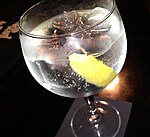Mai Tai
| IBA official cocktail | |
|---|---|
 | |
| Type | Cocktail |
| Primary alcohol by volume |
|
| Served | shaved or crushed ice |
| Standard garnish | spearmint leaves and lime shell |
| Standard drinkware |  |
| IBA specified ingredients |
|
| Preparation | Shake all ingredients with ice. Pour unstrained into glass. Garnish and serve with straw. |
The Mai Tai /ˈmaɪ ˈtaɪ/ is a cocktail based on rum, Curaçao liqueur, orgeat syrup, and lime juice. It is one of the quintessential cocktails in Tiki culture.[1]
History[]
Victor J. Bergeron claimed to have invented the Mai Tai in 1944 at his restaurant, Trader Vic's, in Oakland, California.[2] Trader Vic's forerunner, Donn Beach, claimed to have instead first created it in 1933, although a longtime colleague said that Beach was actually just alleging that the Mai Tai was based on his Q.B. Cooler cocktail.[3][4][5] Don the Beachcomber's recipe is more complex than Vic's and some believe it tastes quite different.[6][7] Others believe that, despite the difference in ingredients, they taste quite similar.[8][9]
The name was allegedly taken from maita'i, the Tahitian word for "good" or "excellence", although the drink is usually spelled as two words, sometimes hyphenated or capitalized.[10][11]
Recipe[]
Most current recipes for Mai Tais based on Trader Vic's 1944 recipe include rum, lime juice, orgeat syrup, and orange liqueur (typically orange curaçao). Variants may include the addition of amaretto, falernum, bitters, grenadine, orange and grapefruit juices, and so on. This wide variance in ingredients used exists because Trader Vic's kept the recipe secret for nearly 30 years, forcing competitors to guess at the ingredients to satisfy customers.[12] Various books from Victor Bergeron described using rum from Jamaica as well as from Martinique, which in modern usage is a Rhum Agricole. As noted in Smuggler's Cove by Martin Cate and Rebecca Cate, the Martinique rums used by Bergeron in the 1950s were most certainly not agricole rums.[13] Overproof rums are sometimes added to make stronger versions,[14] but Cate says references to such use as being from "the old way" was only because a 151 proof (75%) demerara float was the preferred variation of a frequent elderly customer.[15]
Culture[]
The Mai Tai became such a popular cocktail in the 1950s–60s that many restaurants, particularly tiki-themed restaurants or bars, served them. The Mai Tai was also prominently featured in the 1961 Elvis Presley film Blue Hawaii.
References[]
- ^ Curtis, Wayne (2007). And a Bottle of Rum: A History of the New World in Ten Cocktails. New York: Three Rivers Press. p. 227.
- ^ "The Origin of the Mai Tai", [1], tradervics.com via archive.org
- ^ Curtis, Wayne (22 February 2019). "Anatomy of a Classic: The Mai Tai Turns 75". The Daily Beast. Retrieved 25 February 2019.
- ^ "Mai Tai recipe history". eater.com. 10 November 2016. Retrieved 25 February 2019.
- ^ Berry, Jeff (2010). Beachbum Berry Remixed. San Jose: Slave Labor Graphics. p. 64.
- ^ Coulombe, Charles A. (2005). Rum: The Epic Story of the Drink That Conquered the World. Citadel Press. p. 258.
- ^ "The Ultimate Mai Tai". mercurynews.com. 16 March 2016. Retrieved 25 February 2019.
- ^ Berry, Jeff (2010). Beachbum Berry Remixed. San Jose: Slave Labor Graphics. p. 69.
- ^ "The Mai Tai History". caskstrength.wordpress.com. 8 September 2010. Retrieved 25 February 2019.
- ^ Oxford English Dictionary, third edition, s.v. mai tai
- ^ "maitai" Archived 2008-12-02 at the Wayback Machine, Merriam-Webster Online Dictionary
- ^ Berry, Jeff (2010). Beachbum Berry Remixed. San Jose, CA: Club Tiki Press. p. 65. ISBN 978-1-59362-139-1.
- ^ Cate, Martin (2016). Smuggler's Cove: Exotic Cocktails, Rum, and the Cult of Tiki. Berkeley, CA: Ten Speed Press. p. 264. ISBN 978-1-60774-732-1.
- ^ Cacicio, Jennifer (2014-05-21). "Inside LA's Tiki Underground". punchdrink.com. Retrieved 2019-01-30.
- ^ Pardilla, Caroline (2016-11-10). "You deserve a real Mai-Tai". eater.com. Retrieved 2019-01-30.
External links[]
- Tiki drinks
- Cocktails with fruit liqueur
- Cocktails with rum
- Cocktails with triple sec or curaçao
- Cuisine of the Western United States
- Hawaiian cuisine
- Tiki culture
- Cocktails with lime juice
